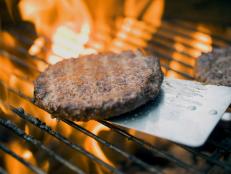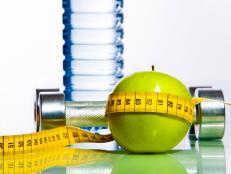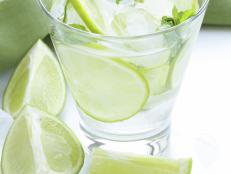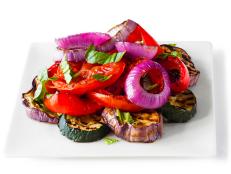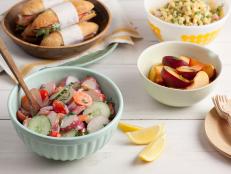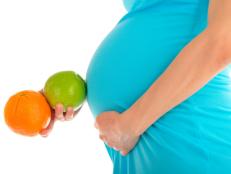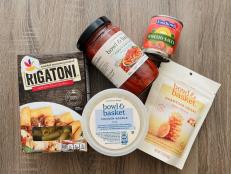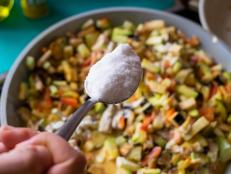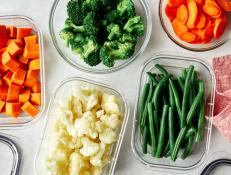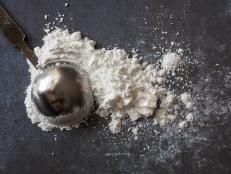How Much Water Do You Need to Drink Each Day?
You don't have to guzzle H2O all day to reach your daily hydration goals.
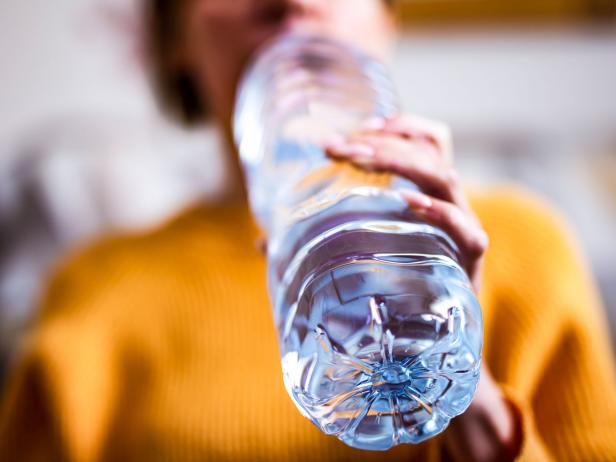
mikroman6/Getty Images
Eight cups a day is such a persistent myth that you might think you know the answer to this question. But the fact is, how much water you need to drink each day depends on a few factors, including your age, gender, activity level and even the weather. For example, if you spend more time in the summer heat your fluid needs go up. The Institute of Medicine, which sets Dietary Reference Intakes for all nutrients, says that in general, women need around 11 cups of water a day, while men need 15.6 cups a day.
Why We Hydrate
About 60% of your body weight is made up of water, which helps control your body temperature, flush toxins, and retain moisture. You’re constantly losing fluids through breathing, sweating, and going to the rest room, and the way to replenish your body’s fluid balance is to drink fluids throughout the day.
What Are the Best Ways to Hydrate?
All fluids count towards you hydration status — so even that cup of coffee or bowl of soup count. Foods account for about 20% of your average fluid intake, while beverages account for the remaining 80%. According to the 2020-2025 dietary guidelines for Americans, calorie-free water should be your top hydration choice. Seltzer and sparkling water are good choices as well. Fluids that contain nutrients like low and nonfat milk and 100% fruit or vegetable juice are the next best thing (in moderation, of course).
Fruits and vegetables also contribute to hydration. According to the Centers for Disease Control, only 1 in 10 Americans meet the daily recommended amount of fruits and vegetables. Taking in the recommended amount to assist with hydration is just another benefit of eating the recommended daily amount of produce.
What About Caffinated and Alcoholic Beverages?
Guzzling that large fancy coffee counts too, but what you don’t want is all those extra calories from added sugar and artery clogging saturated fat. Plus, beverages that contain caffeine and alcohol can contribute to hydration. However, according to the Food & Drug Administration you want to limit caffeine to no more than 300 mg per day (equivalent to three 8 fl oz cups of coffee) and alcohol should also be limited to no more than 1 drink per day for women and 2 drinks per day for men.
So How Much Water Do You Need?
There are several factors that influence how much fluids you need. Here are a few of the most common considerations:
- Exercise: If you’ve been sweating a lot (like after a long, hard workout), you need more than just water to rehydrate you. When you sweat you also lose electrolytes, such as sodium, chloride, potassium, calcium, and magnesium. So if you’ve been working out for over an hour, like on a long run or playing a single tennis match, make sure you get some salt back in you, either through a snack (like a handful of salted pretzels) or a recovery beverage (studies have shown that chocolate milk, which delivers both sodium and protein, makes an excellent recovery beverage). If you’re exercising for less than an hour, plain water is just fine — you don’t want to undo all those calories burned with a sugary sports drink.
- Weather: You need to drink more water if you’re in a hot environment. High humidity also increases your water needs, so make sure you drink enough water and eat water-rich foods (hello fruits and veggies!) when it’s hot out, especially if you’re exercising.
- Weight loss: Water fills you up — it’s one of the reasons eating water-rich, low-calorie foods can help you feel satisfied. In a 2010 study, older adults who drank 2 cups of water before meals lost a few more pounds over 4 months than those who didn’t drink water first.
Toby Amidor, MS, RD, CDN, is a registered dietitian and consultant who specializes in food safety and culinary nutrition. She is the author of The Greek Yogurt Kitchen: More Than 130 Delicious, Healthy Recipes for Every Meal of the Day.
Kerri-Ann Jennings is a registered dietitian who writes on food and health trends. Find more of her work at kerriannjennings.com or follow her on Twitter @kerriannrd or Facebook.
*This article was written and/or reviewed by an independent registered dietitian nutritionist.























